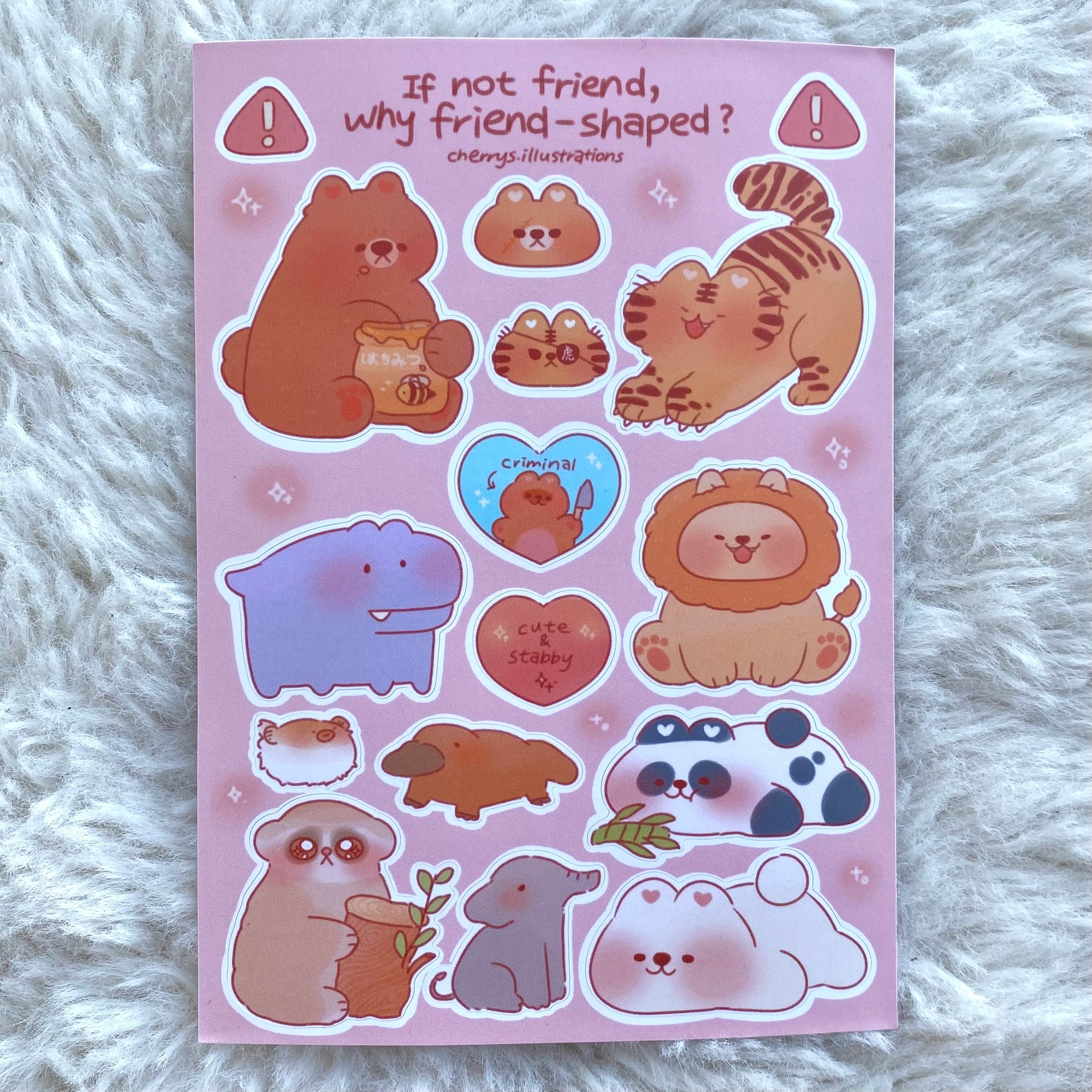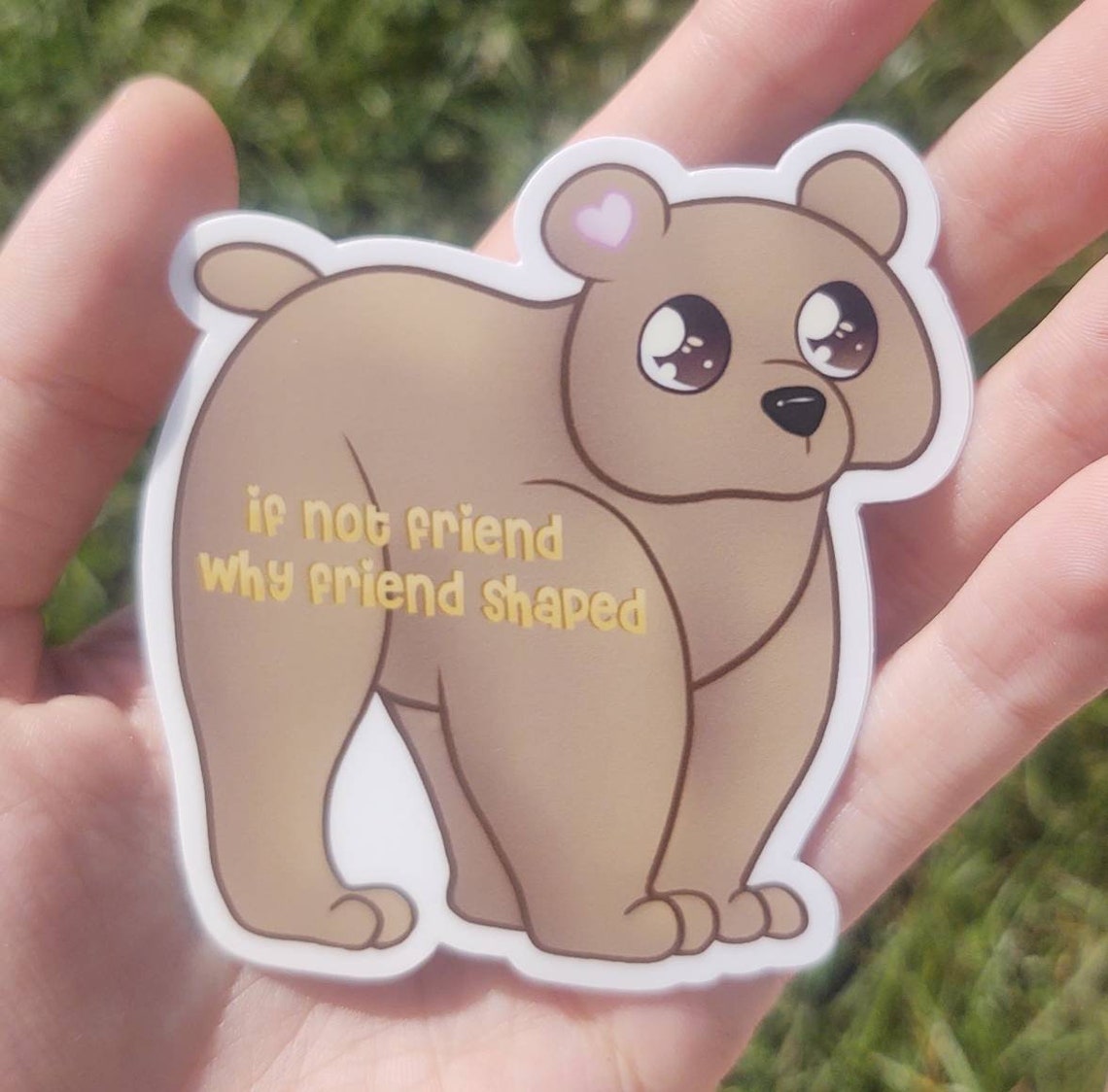If Not Friend, Why Friend-Shaped Origin? Unveiling The Mystery
Have you ever wondered why some friendships feel like they're shaped by destiny, while others seem... well, a bit off? If not friend, why friend-shaped origin? It's a question that’s been buzzing in my mind for a while now. Let’s dive into this intriguing concept and explore the hidden forces behind our connections. Brace yourself, because this journey is about to get real!
You know that feeling when you meet someone, and it’s like, “Whoa, we’re vibing!” But then there are those moments when you’re left scratching your head, thinking, “Wait… why are we even friends?” That’s where the idea of friend-shaped origins comes into play. It’s like a blueprint for understanding why certain bonds form, and others just don’t make sense.
So, buckle up, folks! This article isn’t just about random musings—it’s about uncovering the psychological, social, and even evolutionary reasons behind our friendships. If not friend, why friend-shaped origin? Let’s find out!
Table of Contents
- What Is Friend-Shaped Origin?
- The Evolution of Friendship
- Biological Factors in Friendship
- Social Dynamics
- Psychological Attraction
- Friendship Types
- Friendship Challenges
- Friendship in the Digital Age
- Friendship Maintenance
- Conclusion and Next Steps
What Is Friend-Shaped Origin?
Alright, let’s break it down. Friend-shaped origin is basically the idea that certain friendships have a deeper, almost predestined reason for existing. It’s like there’s an invisible force guiding us toward certain people. But if not friend, why friend-shaped origin? That’s the million-dollar question, right?
Sometimes, the connections we form are based on shared experiences, values, or even biological factors. Other times, it’s just plain old convenience. Think about it—how many friends do you have because of school, work, or family obligations? These are what we call “friend-shaped” relationships. They might not be the deepest bonds, but they still play a role in our lives.
Why Does Friend-Shaped Origin Matter?
Understanding the concept of friend-shaped origin can help us navigate our social lives better. It’s like having a map for your friendships. You’ll know which ones to nurture and which ones to let go of. Plus, it’s kinda cool to think about how some friendships are shaped by forces beyond our control.
The Evolution of Friendship
Let’s take a trip back in time. Back when humans were still swinging from trees, friendship was all about survival. We formed bonds to protect ourselves from predators, share food, and pass on our genes. Fast forward to today, and friendship has evolved into something more complex.
Nowadays, we form friendships for emotional support, shared interests, and sometimes even out of convenience. But the core reason—survival—still lingers. Think about it. Who do you turn to when you’re going through a tough time? Probably a friend, right? That’s evolution at work.
How Has Technology Changed Friendship?
Tech has definitely shaken things up. Social media, messaging apps, and online communities have made it easier to connect with people from all over the world. But has it made our friendships more meaningful? That’s debatable. Some argue that digital friendships lack the depth of in-person connections. Others say they’re just a different kind of bond.
Biological Factors in Friendship
Did you know that biology plays a huge role in who we choose as friends? Studies show that people with similar genetic makeup are more likely to become friends. Crazy, right? It’s like we’re programmed to seek out people who are like us.
But it’s not just about genes. Hormones like oxytocin, often called the “love hormone,” also influence our friendships. This little chemical helps us bond with others, making us feel closer and more connected.
Can Biology Predict Friendship?
Not exactly, but it can give us clues. For example, if you and your friend share similar tastes in music, food, or hobbies, there’s a good chance it’s because of your genetic makeup. Biology might not dictate who we befriend, but it definitely nudges us in certain directions.
Social Dynamics
Social dynamics are another big factor in friendship. Where you live, your social circle, and even your job can influence who you become friends with. Think about it—how many of your friends are from school, work, or your neighborhood?
These social environments shape our friendships in ways we might not even realize. They provide opportunities for us to meet new people and form bonds. But they can also limit our options, especially if we’re stuck in a small, homogenous group.
Breaking Out of Social Circles
So, how do you break out of your usual social circle? It’s all about stepping outside your comfort zone. Try joining a club, volunteering, or attending events where you’ll meet new people. You never know who you might meet—or what kind of friendship might bloom.
Psychological Attraction
Psychology plays a huge role in friendship too. We’re naturally drawn to people who make us feel good about ourselves. Whether it’s through shared interests, complementary personalities, or even just good vibes, psychological attraction is a powerful force.
But it’s not just about feeling good. Studies show that people are more likely to become friends with those who share similar values and beliefs. It’s like we’re wired to seek out people who “get” us.
What Makes a Friendship Click?
There’s no one-size-fits-all answer to this, but there are some common factors. Shared experiences, mutual respect, and open communication are all key ingredients in a successful friendship. And let’s not forget trust—that’s the glue that holds everything together.
Friendship Types
Not all friendships are created equal. There are different types of friendships, each with its own unique characteristics. Let’s take a look at some of them:
- Best Friends: These are the ones you can call at 3 a.m. when life’s hitting you hard.
- Casual Friends: You know, the ones you hang out with occasionally but don’t share your deepest secrets with.
- Work Friends: The people you see every day at the office, but might not hang out with outside of work.
- Online Friends: The ones you’ve never met in person but feel super connected to.
Which Type of Friendship Is Best?
There’s no “best” type of friendship—it all depends on what you’re looking for. Some people thrive on deep, meaningful connections, while others are happy with a wide circle of casual friends. It’s all about balance and finding what works for you.
Friendship Challenges
Let’s face it—friendships aren’t always easy. They come with their own set of challenges. From misunderstandings to life changes, there are plenty of things that can strain a friendship. But that’s where the real work begins.
So, how do you overcome these challenges? Communication is key. Talking things out, being honest, and showing empathy can go a long way in repairing a strained friendship. And sometimes, it’s okay to let go of a friendship that’s no longer serving you.
When Should You Let Go of a Friendship?
This is a tough one, but sometimes it’s necessary. If a friendship is toxic, draining, or just not fulfilling anymore, it might be time to move on. It’s not about cutting people out of your life—it’s about making space for healthier, more positive relationships.
Friendship in the Digital Age
As we mentioned earlier, technology has changed the way we form and maintain friendships. Social media, messaging apps, and online communities have made it easier to connect with people from all over the world. But they’ve also brought new challenges.
For example, how do you maintain a meaningful friendship when most of your interactions are virtual? It’s all about finding a balance. Use tech to stay connected, but don’t let it replace face-to-face interactions.
Tips for Maintaining Digital Friendships
- Set aside time for regular check-ins, even if it’s just a quick message.
- Use video calls to add a personal touch to your conversations.
- Share meaningful content that shows you care about the other person.
Friendship Maintenance
Friendships, like any relationship, require maintenance. It’s not enough to just form a bond—you have to work to keep it strong. This means staying in touch, showing appreciation, and being there for each other through thick and thin.
But don’t worry—it doesn’t have to be a huge effort. Sometimes, the little things make the biggest difference. Sending a text to say “thinking of you” or inviting a friend to coffee can go a long way in keeping a friendship alive.
How Often Should You Check In with Friends?
There’s no hard and fast rule here. It depends on the friendship and your schedules. Some friends might need daily check-ins, while others are happy with a monthly catch-up. The key is to find a rhythm that works for both of you.
Conclusion and Next Steps
So, there you have it—the lowdown on friend-shaped origins. If not friend, why friend-shaped origin? Well, as we’ve explored, there are plenty of reasons why we form the friendships we do. From biology to social dynamics, there are countless factors at play.
But the most important thing to remember is that friendships are what you make of them. Whether you’re nurturing a deep, lifelong bond or enjoying a casual connection, every friendship has value. So, take what you’ve learned here and apply it to your own life. Who knows? You might just discover a whole new level of friendship.
Now, it’s your turn! Leave a comment below and let me know what you think about friend-shaped origins. And don’t forget to share this article with your friends. After all, sharing is caring!
Salt Trick Penis Enlargement: The Truth Behind The Trend
Is Claire Keegan Married? Unveiling The Mystery Behind The Irish Literary Star
What Is This Salt Trick? Unlocking The Secrets Of An Age-Old Solution For Everyday Problems

If Not Friend, Why FriendShaped? Sticker sheet cherry's illustrations

Jigsaw Puzzle 16 pieces If not friend, why friend shaped? Jigidi

If Not Friend Why Friend Shaped Bear Sticker Cute Funny Etsy